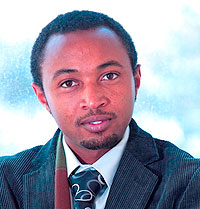In 2010, while I was visiting graduate schools in the United States, I ended up at Tufts University in Boston where I met Dr. Peter Uvin, the dean of the Fletcher School. One of the questions he put to me was “what is Rwanda’s biggest challenge for the future?”


In 2010, while I was visiting graduate schools in the United States, I ended up at Tufts University in Boston where I met Dr. Peter Uvin, the dean of the Fletcher School. One of the questions he put to me was "what is Rwanda’s biggest challenge for the future?”I felt comfortable mumbling on what I thought but it wasn’t too long before I realised my answers bored him at the lunch table. I tried to convince him that unemployment is the country’s biggest economic challenge that could lead to serious future problems.I went one-step further and offered suggestions: "The Rwandan government should invest in manufacturing industries and prepare a conducive terrain for investments. If not,” I added, "I fear Rwanda would have to deal with consequences of brain drain and possibly capital flight where the brightest among us are leaving Rwanda and working elsewhere and Rwandans investing their money outside the country.” Body language never lies— Mr. Uvin did not like my answer.If Peter asked me the same question today, I would have a very different answer. I see Rwanda’s youth as our greatest challenge for the future — if there is one thing I worry most about regarding the future of Rwanda, it is this upcoming generation. It is them who will carry the success story of Rwanda forward or let it slip way. They are the bridge generation capable of being entrusted with the preservation of Rwandan values and pass them onto the next generations, while at the same time being the practitioners of a technological world.But what concerns me most about the generation born in the 1990’s who seem to live in globalised Rwanda is that they are giving new meanings to the breaking of taboos and the suppression of traditional cultural values with new norms of life. Drinking alcohol used to be a privilege of the elders. Today, being drunk is a fashionable thing among teens. Those who choose not to drink alcohol get high by smoking weed. Sexuality and family orientation is slowly reflecting an influence of the west.Call it consequences of technology or globalisation, these kids are adapting faster to a changing world than any other generation before them.Information sharing and use of mobile devices is redefining relationships and communication. They are nakedly exposed in the waves and ripples of the 21st century. What is at stake is losing the flavours of our culture and honoring what makes us uniquely Rwandans. This very same generation is one that Rwanda is nurturing with expectations to move the country forward and deliver on shortcomings recorded in the past. The ground has been prepared for us. Rwanda is a country more unified than it has ever been. The economy is doing well and the political obsession to maintain security and promote peace in the region continues to be at the core of Rwanda’s foreign affairs. . There is another category of youth. I like to call them "the chosen ones”—the Ministry of Education has established funding for young students who excel in sciences— math, physics, chemistry and other fields of engineering. Those with interest in computer science, information technology and human health sciences are the lucky ones. Their stars are aligned with the government’s priority of investment within the educational system: technology.I am not in favor of such selective priorities, especially, in a country like Rwanda that is still finding its way in a globalized world. I cannot think of one country in the world that has succeeded on engineering alone.Not one. Countries like Germany, USA, Japan, and now China, did not ignore the necessity of the humanities and the social sciences. In Rwanda, the humanities, the arts, and alongside social sciences have simply been put aside—it feels like an intended omission. This is a recipe for a big problem in the future. The calls of President Paul Kagame reminding Africans in general, and Rwandans, in particular, of the importance of owning and telling their stories echo out loud in my head. Has it ever crossed your mind that maybe, just maybe, art and literature aren’t as important as computer science and economics? At least, that’s what priorities outlined by the government tells me.But Rwanda needs artists, historians, political scientists, journalists, philosophers, and dreamers, just as it needs mining engineers and biochemists. Why not give a chance everyone who is willing to work hard? A diverse future benefits everyone.If the youth hold the future of Rwanda, I think investing in an all-inclusive education is a way to eliminate unnecessary intellectual and creative gaps in the future. Of course, the government is not doing this blindly—they know the urgency of creating a scientific platform on which Rwanda can depend and compete with other countries around the world. But this scientific infrastructure needs other educational pillars to hold it up if it is to remain strong.That said, I look forward to the time when Rwanda will become the equivalent of Silicon Valley within the Eastern Africa Community. In that future, I would love to see more Rwandans artists, writers, diplomats, attorneys, and teachers, celebrating a diverse community where anything is possible.A broad, diverse education on behalf of those coming of age in Rwanda is ultimately, a prudent goal if we care about the long view of history and not the short view of expediency. Quite simply, the arts and humanities remind us what it means to be human.


